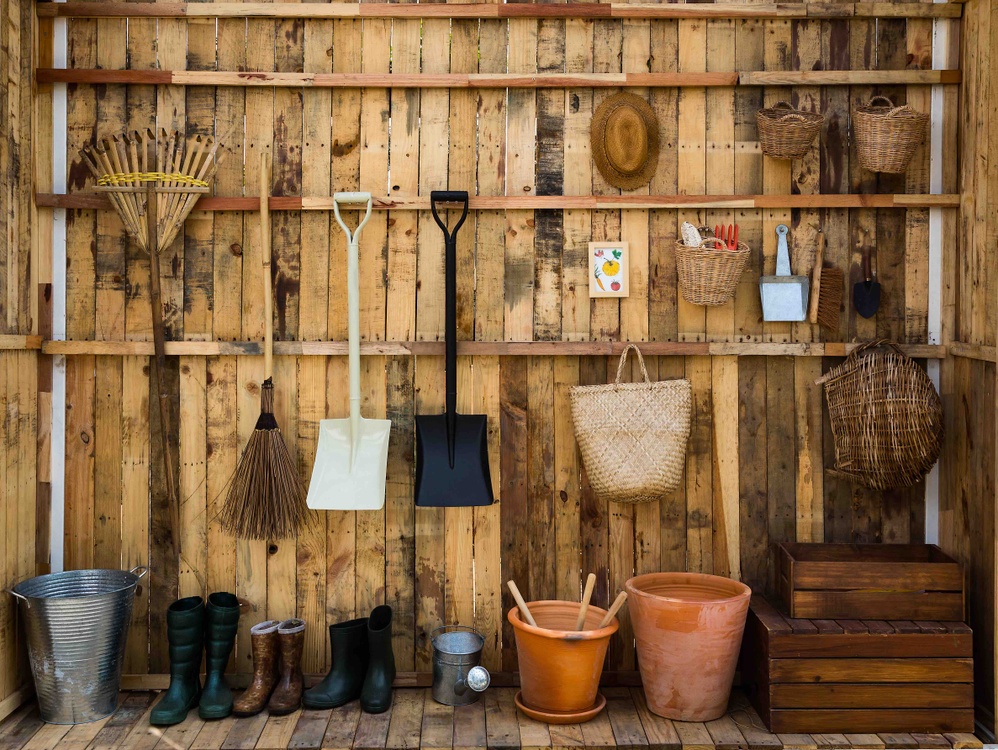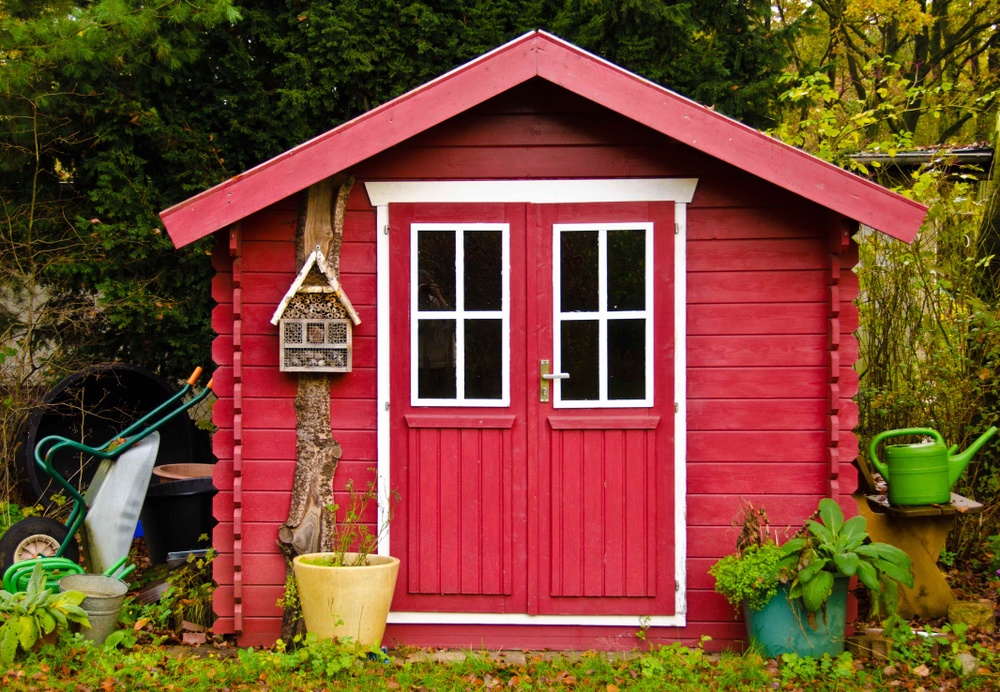One of the best parts of moving into a new house is being able to cultivate a gorgeous garden space. That being said, there’s a fair amount of upkeep that goes into keeping the garden of your new house flourishing in an orderly fashion.
If you’re an avid gardener, you are probably no stranger to a horticulturist’s most uninvited of guests — rust. Rust is a common problem that many gardeners face with their tools and sheds. Not only does rust make your gardening equipment look unappealing and worn, but it can also weaken metal and cause your precious tools to break down over time. Fortunately, there are several effective strategies for preventing rust on garden tools and sheds.
Today, we share 6 of the best methods for keeping your garden tools and shed rust-free, ensuring bright and shiny exteriors for years to come. Read on to find out more.
-
Create A Maintenance Plan For Your Garden Tools
When it comes to keeping your garden tools in tip top condition, it all starts with creating a solid maintenance plan that you can religiously stick to. The last thing you want is to invest in a quality set of WB tools, only to have them ruined by rust due to inappropriate maintenance. For starters, the most basic step to prevent rust on garden tools is to keep them clean and dry. After each use, wipe them down with a clean, dry cloth to remove any dirt or moisture that may have accumulated on them. Rust-resistant coatings such as zinc and chrome plating can also be applied to garden tools to prevent rust formation. Additionally, storing garden tools in a dry environment is one of the best ways to prevent rust. Moisture is the main cause of rust formation, so it is important to keep garden tools in a place where they will not be exposed to excess moisture. If possible, store them in a garden shed or garage where there is good ventilation and low humidity. Alternatively, if you live in an apartment unit, or a townhouse with a narrow house design, storing your tools in a weather-resistant storage box that is specifically designed for outdoor use is a great way to keep them in prime condition for longer.
Top Tip: Did you know that dull garden tools can lead to rust formation due to increased friction and moisture retention? Thankfully, all you need to do is to sharpen your garden tools regularly to reduce the risk of rust formation.

-
Apply Oil Or Wax To Garden Tools
In addition to creating a maintenance plan for your garden tools, it is also a good idea to consider applying oil or wax to them. Applying oil or wax to garden tools can help prevent rust by creating a barrier between the metal and moisture. There are many different types of oils and waxes that can be used, such as linseed oil, mineral oil, coconut oil, walnut oil and beeswax.
Apply a thin layer of the chosen product to the metal surface of your tools and let them dry before storing. With this simple step, you will be able to keep the metal elements of your tools rust-free, while preventing drying the cracking of wood handles at the same time.
Another fantastic method of keeping both your garden tools and shed rust-free is to use a rust converter. A rust converter is a product that chemically reacts with rust to convert it into a stable compound that can be painted over. As such, a rust converter is especially useful for garden tools or sheds that have already started to rust.
Instead of throwing your rusted tools out, apply a rust converter to the affected area of the tool and let it sit for the recommended time before painting over it. Follow the same steps for rusted metal surfaces in the garden shed by using a brush or spray can to thoroughly cover rusted areas before drying and painting. This will help protect both your tools and shed from further rust formation, keeping them in tip top condition for years to come.
Learn how to paint over rusted garden tools here.

-
Use A Dehumidifier When Working In Your Shed
A dehumidifier can be a useful tool to have when working in your garden shed, particularly if your shed is prone to moisture buildup or experiences high humidity levels. This is mainly because high humidity levels can lead to moisture buildup, which can in turn cause rust, corrosion, and other forms of damage to your tools and equipment. High humidity levels can also contribute to poor air quality in a garden shed, leading to mould and mildew growth and unpleasant odours.
Thankfully, a simple and inexpensive dehumidifier can help to improve air quality by removing excess moisture from the air. To ensure the best results when using a dehumidifier in a garden shed, it's important to choose the right size and capacity for the size of the shed and the amount of moisture present. As a starting point, we recommend measuring the length and width of your garden shed to determine its square footage. This will give you an idea of how much area the dehumidifier needs to cover.
-
Consider Ventilation & Drainage Carefully
Ensuring you have plenty of ventilation and draining in your garden shed is another important element to steel shed and tool rust prevention. If your shed doesn’t already have vents or windows, now is the perfect time to consider adding them. This will allow fresh air to get into your space and will help dry out areas where moisture tends to collect, thus preventing rust from forming on both your tools and shed. In addition to adequate ventilation, proper drainage is equally as important to prevent water from seeping into your garden shed and causing damage.
As a general rule, a garden shed should be built on a level surface and equipped with gutters and downspouts to direct water away from the shed. If water does enter the shed, it should be able to drain out quickly and easily. By incorporating ventilation and drainage into your garden shed design, you can prevent moisture buildup and prolong the lifespan of your tools and equipment, while also maintaining a comfortable and safe working environment in your shed.
-
Avoid Cleaning With Harsh Chemicals
Last but not least, if you are currently using harsh chemicals to clean your shed and tools, the bad news is that you may actually be doing more harm than good. Unfortunately, harsh chemicals can damage the metal surface of garden tools and increase the risk of rust formation. For instance, bleach can cause rust, discolouration and corrosion on the metal surfaces of your tools and garden shed. Instead of reaching for the harsh chemicals, consider using natural alternatives such as vinegar, baking soda, and lemon juice.
As an added bonus, baking soda also neutralises acids that can cause rust to form, thus further safeguarding your gardening arsenal from unwanted rust.
________________
And there you have it — 6 simple yet effective methods for keeping your precious garden tools and shed rust-free for decades to come. Keep these tips and tricks on hand to help prevent rust forming on your garden tools and tool shed from season to season.
Publisher Website: www.wbtools.com.au